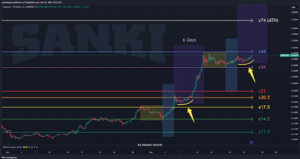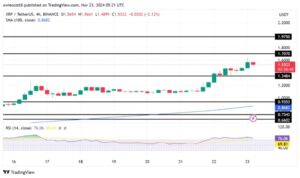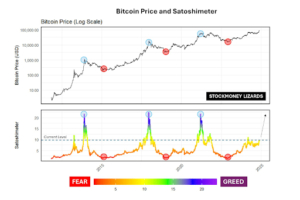US-based cryptocurrency exchange Kraken, the sixth largest trading volume, is gearing up to launch its blockchain, Ink, in early 2025. This new platform aims to facilitate decentralized applications (dApps), enabling users to trade, borrow, and lend tokens without intermediaries.
Kraken's Ink Blockchain Goals
According to a recent postponement by Bloomberg, Ink will utilize technology similar to that of Coinbase's Base, which has rapidly emerged as one of the largest DeFi platforms since its launch over a year ago.
Andrew Koller, the founder of Ink, stated that a testnet will be introduced later this year, allowing developers to experiment with applications before the blockchain opens to retail and institutional users in the first quarter of 2025.
Built on Optimism's Superchain, Ink is designed to improve user engagement with “top-tier” decentralized finance (DeFi) applications, protocols, and communities, the company said in a blog post on Thursday.
The new blockchain will align with the broader Ethereum ecosystem by leveraging Ethereum's security and joining the Superchain – a unified network of blockchains that share security and governance standards.
Koller emphasized that Ink is unique as the only blockchain backed by a major Western exchange focused on creating an “optimal DeFi experience.” The platform's vision is to foster a “capital-efficient” ecosystem that prioritizes community involvement and innovation while ensuring that the benefits of Challenge are accessible to all.
Launching a proprietary blockchain aligns with a broader trend among crypto exchanges that have seen significant growth and revenue generation from their blockchain initiatives.
Notable examples include Binance's BNB Chain and Coinbase's Base, both of which have successfully driven user engagement and transaction volume.
Ink To Support RWAs And Advanced Lending Applications
At its launch, Ink is expected to host over a dozen applications, including decentralized exchanges and aggregators. Koller anticipates that the blockchain could eventually support the real-world assets (RWAs) sector and advanced lending applications.
Initially, Kraken plans to serve as the chain's sequencer, managing and organizing transactions to generate revenue. However, Koller indicated that this role would eventually be decentralizedallowing multiple parties to share the responsibility.
As Kraken continues to develop Ink, approximately 40 team members are dedicated to the project. The company is also planning events for developers, including participation in Devcon in Thailand this November.
Founded in 2011 in San Francisco, Kraken has been expanding its product offerings while considering a potential initial public offering (IPO). However, like many companies in the crypto space, Kraken's future may be influenced by upcoming changes in US cryptocurrency regulationsespecially in light of the upcoming elections.
The exchange faced regulatory scrutiny last year when the US Securities and Exchange Commission (SEC) charged it with operating as an unregistered broker. In February 2023, Kraken settled separate charges related to its staking services.
Featured image from DALL-E, chart from TradingView.com



